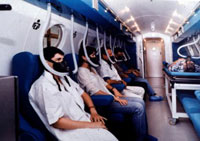Office of Research & Development |
 |


It has been a hot question among military and VA doctors for several years now: Can hyperbaric oxygen therapy effectively treat traumatic brain injury (TBI)? The Department of Defense, in collaboration with VA, has been conducting four clinical trials to learn the answer. The first study, recently concluded, finds no evidence of benefits from the therapy with regard to TBI symptoms.
The trial took place at the U.S. Air Force School of Aerospace Medicine in Texas. It included 50 Service members who had suffered at least one mild TBI while deployed. Over eight weeks, each participant received 30 sessions of either real hyperbaric therapy or sham treatment. The researchers administered a test called the Immediate Post-Concussion Assessment and Cognitive Testing just prior to the start of therapy and six weeks after it ended. They also administered a PTSD questionnaire. The researchers found no significant differences in how the two groups scored on either measure.
During hyperbaric therapy, patients sit in a special chamber and breathe in pure oxygen at an elevated ambient pressure. This allows the oxygen to permeate injured organs and tissue. The therapy is covered by Medicare and used widely for several medical conditions, including some types of skin wounds and internal injuries. But its use in treating brain injury has remained controversial.
According to VA's David Cifu, MD, one of the study authors, this first study "does not demonstrate any efficacy for HBOT in symptomatic mild TBI, but it was designed as a feasibility trial"—to test and validate approaches to subject recruitment, outcome measures, and treatment and sham protocols. Cifu is national director for VA's Physical Medicine and Rehabilitation program. He is also chair of the PM&R department at Virginia Commonwealth University.
Three other DoD-funded studies are under way: a large military clinical trial in Colorado; another trial including Service members based in Pensacola, Fla., and Richmond, Va.; and a civilian trial in Salt Lake City.
Cifu said results from all four studies, taken together, "should answer the question" of whether HBOT can reduce TBI symptoms.
(Journal of Neurotrauma, online Oct. 2, 2012)